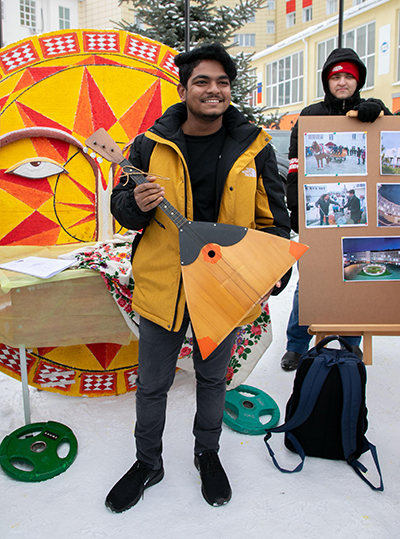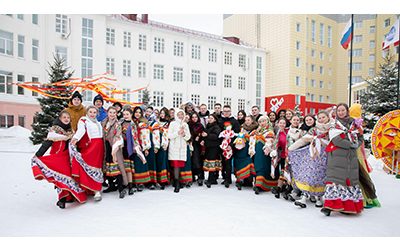The celebration of Maslenitsa is of particular importance in Russia! At the same time, it is worth noting that 2022 is dedicated to the cultural heritage of the peoples of Russia “in order to popularize folk art and preserve cultural traditions, historical and cultural monuments, ethno-cultural diversity, cultural identity of all peoples and ethnic communities”, the Decree of the President of the Russian Federation V. Putin provides.
Maslenitsa is a Russian holiday with a history dating back to the deepest pre-Christian period. This holiday is celebrated for seven days, from Monday to Sunday. The whole week is divided into two periods: Narrow Maslenitsa and Wide Maslenitsa. Narrow Maslenitsa — the first three days: Monday, Tuesday and Wednesday, Wide Maslenitsa — the last four days, from Thursday to Sunday. Each day of the Maslenitsa week has its own name with a unique meaning: Monday – “meeting”, Tuesday – “start of merriment”, Wednesday – “lakomka (gourmand)” (or “open air celebrations”), Thursday – “wide”, Friday – “mother-in-law’s evenings”, Saturday – “sister-in-law’s gatherings” (“farewell ceremony”), and Sunday – “day of forgiveness”.
In Kursk, Tambov and other governorates of Central Russia, the first baked blin (thin pancake) was placed on the roof window of the house, thereby “dedicating it to parental souls”. Maslenitsa was celebrated noisily and cheerfully – people rode the sleigh from the slides, organized fistfights, sang songs and did a circle dance.
The famous “Timonya” – a mass dance in a circle with singing of choruses accompanied by an instrumental play, is even now widespread in the southern areas of the Kursk region, especially during the Maslenichny week.
On March 5, students took part in a cultural and educational event, where they got acquainted with the traditions of celebrating the Maslenitsa of the Slavic peoples. They learnt about the history of national Russian costumes, folk songs and games, and, of course, a generous table with pancakes was set. Round, golden brown, hot…, — blini are a symbol of the sun, and of renewal and fertility as well.
The traditional Maslenitsa treat was tasted by everyone with pleasure. The pancakes were especially to the taste of foreign students.
– Despite the cold, everything was informative and very fun – a student from Brazil Deborah Bispu shared her impressions. – Snow is exotic for me, but I look forward to spring! Let the spring come soon!
– 2022 is dedicated to the cultural heritage of the peoples of Russia. Maslenitsa is the most vibrant folk festival. Today, not only Russian students of KSMU, but also students from other countries got acquainted with the traditions – A.A. Kuznetsova, Vice-Rector for Educational Work, Social Development and Public Relations of KSMU, comments. – Our task is to preserve cultural traditions, to introduce all students of our multinational university to them.



